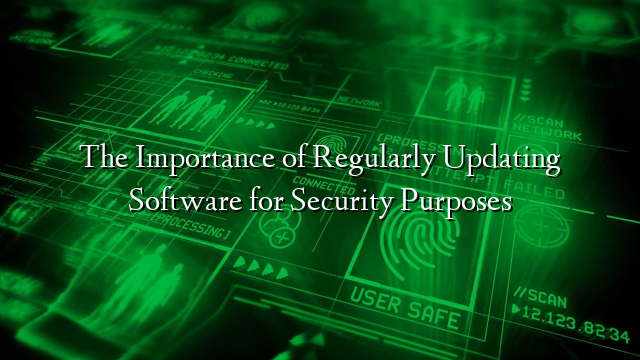The Importance of Regularly Updating Software for Security Purposes
Software updates are a crucial aspect of maintaining the security and integrity of computer systems. In today’s digital age, where cyber threats are becoming increasingly sophisticated, regularly updating software is more important than ever. This article explores the reasons why software updates are essential for security purposes and provides valuable insights into the potential risks of neglecting this crucial task.
The Evolving Threat Landscape
The threat landscape is constantly evolving, with hackers and cybercriminals finding new ways to exploit vulnerabilities in software. By regularly updating software, users can protect themselves from these emerging threats. Software updates often include security patches that address known vulnerabilities and weaknesses in the system. Ignoring these updates can leave your computer or device exposed to potential attacks.
Case Studies
Several high-profile cases highlight the importance of regularly updating software for security purposes. One such example is the WannaCry ransomware attack that occurred in 2017. This attack affected hundreds of thousands of computers worldwide, exploiting a vulnerability in outdated versions of the Windows operating system. Microsoft had released a security patch months before the attack, but many users had failed to update their systems, leaving them vulnerable to the ransomware.
The Role of Software Updates in Vulnerability Management
Software updates play a crucial role in vulnerability management. As new vulnerabilities are discovered, software developers release updates to address these issues. By regularly updating software, users can ensure that their systems are protected against the latest threats. Neglecting software updates can lead to significant security risks, as hackers often exploit known vulnerabilities to gain unauthorized access to systems.
The Importance of Patching
Patching is a critical aspect of software updates. Patching involves applying updates to fix vulnerabilities and bugs in software. These patches are designed to address specific security issues and improve the overall performance of the software. By regularly patching software, users can ensure that their systems are up to date and protected against potential threats.
Benefits of Regularly Updating Software
Regularly updating software offers several benefits, including:
- Enhanced Security: Software updates often include security patches that protect against the latest threats.
- Improved Performance: Updates can optimize software performance, resulting in faster and more efficient operations.
- New Features: Updates may introduce new features and functionalities, enhancing the user experience.
- Compatibility: Updates ensure that software remains compatible with the latest hardware and operating systems.
Q&A
Q: How often should I update my software?
A: The frequency of software updates depends on the specific software and the vendor’s release cycle. However, it is generally recommended to enable automatic updates whenever possible to ensure that you receive the latest security patches and updates in a timely manner.
Q: Can I manually check for software updates?
A: Yes, most software applications have a built-in option to check for updates manually. You can usually find this option in the settings or preferences menu of the software. It is a good practice to periodically check for updates, especially for critical software such as operating systems, web browsers, and antivirus programs.
Q: What if I have older hardware that may not support the latest software updates?
A: If you have older hardware that may not support the latest software updates, it is still important to keep your software as up to date as possible. While you may not be able to install the latest version, you should still apply any available security patches or updates that are compatible with your system. This will help mitigate some of the security risks associated with outdated software.
Conclusion
Regularly updating software is crucial for maintaining the security and integrity of computer systems. The evolving threat landscape and the potential risks associated with neglecting software updates highlight the importance of staying up to date. By regularly updating software, users can protect themselves from emerging threats, ensure vulnerability management, and enjoy the benefits of enhanced security, improved performance, and new features. Don’t overlook the importance of software updates – they are a vital component of a robust cybersecurity strategy.
Advertisement
Scroll to Continue With Content




